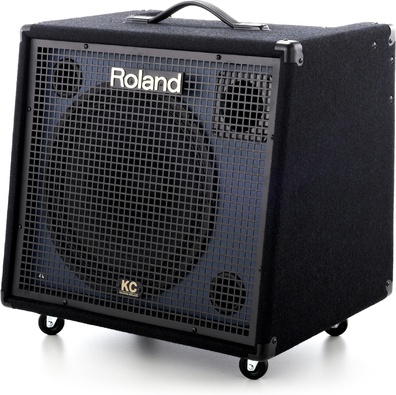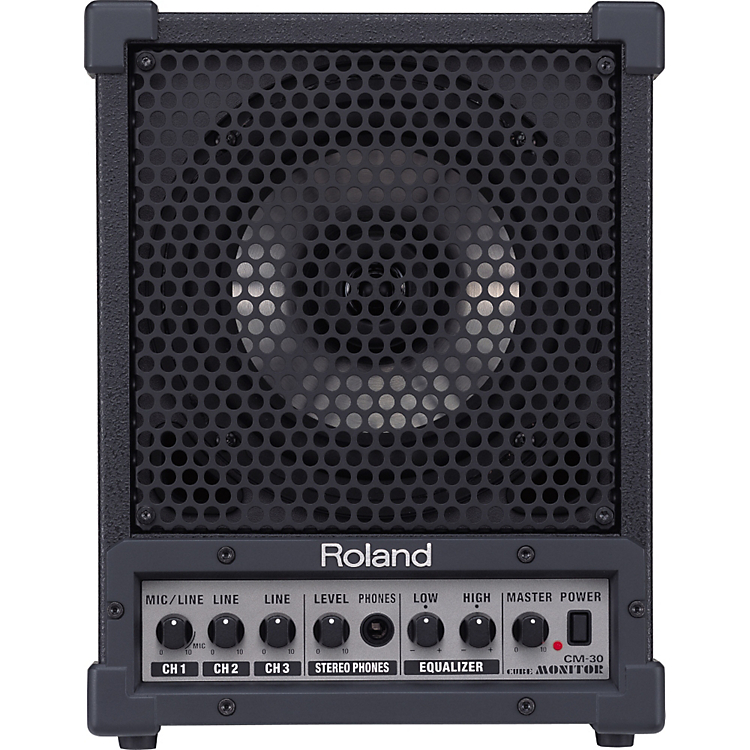
Roland KC-600
Keyboard Amplifier
Buy from Guitar Center $699.99We receive a small kickback from our partners when you click through and purchase the great gear we recommend. Details
Our Favorite Keyboard Amplifier
Roland KC-600
- Don Makoviney
- Last Updated: August 27, 2020
If I needed a self contained keyboard amp for rehearsals and live performance, I'd get the Roland KC-600. It's reliability and sonic capabilities are attested to in magazine reviews, forum reviews, and music gear websites stretching back over 20 years. If you want a keyboard amp which easily handles whatever you throw at it sonically, is rugged physically, the Roland KC-600 is the one to get.
Who Should Buy This Keyboard Amp?
If you need a reliable keyboard amp that sounds great, can double as a minimal PA system for small gigs and rehearsals, then this is the one to get.
The Criteria For A Great Keyboard Amp
We like gear that requires minimal fuss. So in addition to the items mentioned above, we also want the ability to effortlessly shape our sound. So, an adjustable EQ is also a requirement:
From Performer Magazine:
And lastly, look for keyboards amps that offer at least a basic EQ adjustment. As mentioned previously, you may end up fighting for space in the same frequency range as some of your fellow musicians, so being able to tweak your equalization on-the-fly at a gig can come in handy.
Can I Just Use A Guitar Amp?
This is a common question, and the answer is, no. A guitar amplification circuitry is built around the natural frequency response and tone of a guitar. In fact, Sweetwater Sound has a great explanation:
Consider it from a design perspective – guitar amplifiers are meant to be part of a guitar’s tone, and color the original signal. They’re designed to sound great with one instrument – guitar. But keyboard amplifiers have to be flexible when you consider that most professional sample-based keyboards can play piano, strings, synth sounds, drums, and more. Most keyboard amplifiers are designed to reproduce full-range sound as accurately as possible – almost the opposite of what a guitar amplifier is designed for. While there are some exceptions, like rotary-speaker amps that have become iconic for certain styles, you’ll most likely want an amplifier that simply and faithfully reproduces the sounds of your keyboard.
Our Pick
The Roland KC-600 is going to be the best option for most people. 200 watts is more than enough to fill a small-to-medium sized venue, plenty loud enough for rehearsing.
It also works well as a keyboard monitor in larger settings. It has a XLR (mic output cable) so you can send your signal directly to the mixing board, while using it as a keyboard monitor.
I would get the KC-600 because I’ve worked with so many keyboard players who recommend it, and play through it themselves. Like I mentioned at the outset, it has happy customers and online reviews stretching back over 20 years!
Since we like gear that has a great track record for reliability, which gets you up and running and making music as quickly as possible, it’s easy to make this our pick. It’s a no-brainer.
If spending $700 for a keyboard amp seems like too much, think about this: you will be completely self-contained. Durable, rich-sounding, and loud enough to get up and running quickly. It’s flexible enough to work in about any situation.
But we do have some less expensive options as well.
Our Favorite Budget Options
For $250 you can get the 30-watt Roland CM-30 Cube Monitor. It’s surprisingly loud, without distorting at 30 watts, and is super sturdy. It also has a 3-channel mixer on-board. Should you want to use it in a rehearsal or live performance environment, it has a sweet adapter for the bottom so you can screw it on to the top of a mic stand and have it elevated up near your (and your band mates’) ears.
Reviews are a solid 5-stars across many music gear websites.
In fact, one reviewer noted:
“For a small amp/monitor it’s got about every kind of input I can think of, plus headphone capability. 30 watts is louder than I thought it would be when it’s turned up. Surprising amount of bass reproduction for such a small speaker. Seems very solidly built. Front speaker mesh is metal, built in handle is very sturdy. Controls have a good feel to them, input jacks seem pretty good.”
It’s a great budget buy and one we strongly recommend.
Other Options
You may notice that pretty much all of the legit keyboard amps have a built-in mixer of some sort – usually 3-4 channels. This is because a keyboard amp is basically a super duper portable PA system, and the cost to integrate a minimal mixing system with separate channels is really worth it.
As mentioned earlier, in the absence of a suitable amp, keyboard players often just plug directly into the house PA, or the band’s PA system, and shape the sound from there, feeding it back to the keyboard player through the monitor system.
For this reason, an actual, small portable PA system might be the answer. It can double as a rehearsal PA, or a monitor system where club PAs are inadequate.
Here’s why:
Your PA system can now double as amplification for a vocalist or two, as well as a an accompanying instrument. Then, in the instances you play a venue where there is a suitable PA system, you can simply use your own band’s PA system as an amp and monitor.
Keyboard Magazine agrees:
Gigging keyboardists have been a huge reason for the success of a product that, with a few exceptions, hasn’t been marketed as a “keyboard thing.” That, of course, is the portable powered [PA system or] stage monitor. They tend to have much more power than keyboard combo amps, reproducing the full frequency range with no coloration and more than enough volume to stand between the drummer and guitar player.
If this seems like something you would like to do, check out our recommendations for best portable PA systems.
Conclusion
Naturally, if you have more specific needs, or rotating organ speakers, simply move up or down in your pick. But If you want a keyboard amp which easily handles whatever you throw at it sonically, is rugged physically, the Roland KC-600 is the one to get.
More specs below:
Tell Me If There's A Deal For This
Our Favorite Keyboard Amplifier
Roland KC-600

Important Specs
| Power | 200 watts |
| Speakers | 15" speaker and horn tweeter |
| EQ | 3-band |
| Input | XLR microphone |
| Input | RCA aux stereo |
| Output | XLR out for mixers |
| Output | 1/4" out phono for recording |
| Subwoofer Output | Compatible with Roland's KCW-1 |
| more specs |
Synopsis:
We currently use a portable PA System, but if I needed a self contained keyboard amp for rehearsals and live performance, I'd get the Roland KC-600. It's reliability and sonic capabilities are attested to in magazine reviews, forum reviews, and music gear websites stretching back over 20 years. If you want a keyboard amp which easily handles whatever you throw at it sonically, is rugged physically, the Roland KC-600 is the one to get.

The Practice At Home Option
Roland CM-30 Cube Monitor
If playing through computer speakers or through your studio speakers doesn't cut it for some reason, the Roland CM-30 Cube Monitor is great for at-home practice, as well as a live performance monitor. It's 30 watts is surprisingly loud and rich. It even comes with a mic stand adapter, so you can pop it on a mic stand and put it up near your ear. This is a great monitoring solution when playing live.
Sources
-
Benjamin Ricci, Performer Magazine, 20120709
Performer’s Guide to Keyboard Amps“And lastly, look for keyboards amps that offer at least a basic EQ adjustment. As mentioned previously, you may end up fighting for space in the same frequency range as some of your fellow musicians, so being able to tweak your equalization on-the-fly at a gig can come in handy.”
-
Staff, Sweetwater Sound, 20130626
Keyboard Amplifier Buying Guide“Consider it from a design perspective – guitar amplifiers are meant to be part of a guitar’s tone, and color the original signal. They’re designed to sound great with one instrument – guitar. But keyboard amplifiers have to be flexible when you consider that most professional sample-based keyboards can play piano, strings, synth sounds, drums, and more. Most keyboard amplifiers are designed to reproduce full-range sound as accurately as possible – almost the opposite of what a guitar amplifier is designed for. While there are some exceptions, like rotary-speaker amps that have become iconic for certain styles, you’ll most likely want an amplifier that simply and faithfully reproduces the sounds of your keyboard.”
-
Staff Writer, Keyboard Magazine, 20130423
Powered Speakers that Make Great Keyboard Amps“Gigging keyboardists have been a huge reason for the success of a product that, with a few exceptions, hasn’t been marketed as a “keyboard thing.” That, of course, is the portable powered stage monitor. They tend to have much more power than keyboard combo amps, reproducing the full frequency range with no coloration and more than enough volume to stand between the drummer and guitar player.”
-
Staff, Musician's Friend, 20150207
Keyboard Buying Guide“As a keyboardist, you may opt for solid-state to get clear, distortion-free piano reproduction or tubes to create an antique effect with an organ or other specialty sounds and effects. ”
-
Staff, Guitar Center, 20150207
Keyboard Amp Buying Guide“You need your amp to be flexible to hit all of the unique sounds your instrument produces, as well as powerful to cut through the rest of the band.”
Important Specs
| Power | 200 watts |
| Speakers | 15" speaker and horn tweeter |
| EQ | 3-band |
| Input | XLR microphone |
| Input | RCA aux stereo |
| Output | XLR out for mixers |
| Output | 1/4" out phono for recording |
| Subwoofer Output | Compatible with Roland's KCW-1 |
| more specs |
Follow MSCGR
Talk To Us
Did we miss a recommendation? Is there something you'd like to see us review? Typos? Mistakes? If so, drop us a line.

